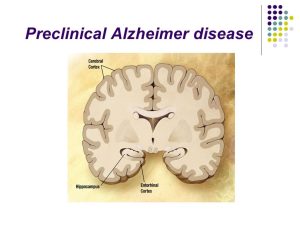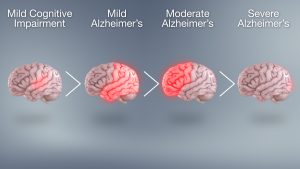Alzheimer’s Disease
Stages of Alzheimer’s Disease
Alzheimer’s, the prevalent form of dementia impacting over 6 million in the U.S., unfolds through distinctive stages. Let’s delve into these stages, shedding light on symptoms and the evolving nature of this neurocognitive disorder.
1. Preclinical Alzheimer’s Disease
Discover the subtle transformations preceding visible symptoms. Early detection methods, such as biomarkers and genetic testing, offer a glimpse into the intricate changes within the brain. Key points include:
- Early signs manifest years before diagnosis.
- Biomarkers like amyloid-beta deposits are detectable.
- Genetic testing aids in predicting Alzheimer’s risk.

2. Mild Cognitive Impairment
Uncover the subtle shifts in cognitive abilities. Mild Cognitive Impairment (MCI), affecting 12–18% of those over 60, serves as a bridge to dementia. Key considerations include:
- Lifestyle choices impact MCI management.
- Symptoms include forgetfulness and “brain fog.”
- Currently, no drug treatment is available for MCI.
3. Mild Dementia
Explore the initial diagnosis stage where memory and cognitive challenges become noticeable. This early stage affects daily life and motivation. Key insights include:
- Diagnosis marks the beginning of noticeable symptoms.
- Challenges include repeated questions and reduced motivation.
- Impact on daily life becomes evident.

4. Moderate Dementia
Witness the deepening confusion and forgetfulness. The moderate stage, lasting 2–4 years, necessitates assistance with daily tasks. Key features include:
- Increased confusion and forgetfulness.
- Assistance required for daily tasks and self-care.
- Longest stage, demanding heightened caregiving.
5. Severe Dementia
Experience the significant decline in both physical and mental functioning. Recognize the challenges faced during this stage, including:
- Difficulty communicating and using language coherently.
- Increased risk of pneumonia and other health complications.
- Caregivers may encounter aggression and hallucinations.

Disease Progression and Outlook
Alzheimer’s progression is nuanced, influenced by factors like age, genetics, and overall health. Medications provide temporary relief, while lifestyle changes may contribute to slowing down progression. Key considerations include:
- Disease progression varies among individuals.
- Medications offer temporary relief for cognitive symptoms.
- Lifestyle changes, including a healthy diet and regular exercise, may slow progression.
Life Expectancy and Takeaway
Alzheimer’s, currently the sixth leading cause of death in the U.S., impacts a significant portion of the aging population. Life expectancy post-diagnosis averages 4–8 years, emphasizing the need for understanding and support. Key takeaways include:
- Alzheimer’s affects 1 in 3 individuals aged 65 and older.
- Life expectancy post-diagnosis varies based on several factors.
- Ongoing research explores early detection and potential interventions.
Conclusion
In conclusion, Alzheimer’s is a multifaceted neurocognitive disorder. While there’s no cure, comprehensive awareness and support play pivotal roles in enhancing the quality of life for individuals and their caregivers. Ongoing research aims to detect the disease earlier and explore potential interventions, offering hope for the future.










